#gàidhlig
Text
Irish, Welsh and Scottish Gaelic speakers, I need your help! 🇮🇪🏴🏴
For a piece of academic writing I am working on right now, I was wondering if in the context of those three languages, you have positive or negative examples of:
1) The presence of non-standard dialects digitally or in the media (any content creator you know, any regular speakers on the radio that actively uses a non-standard dialect, or on the contrary, you only encounter standard Irish/Welsh/Gaelic. If you have any example of non-standard writing too, for example in the printed press, I am all ears)
2) Do you speak and/or write a non-standard dialect and have been looked down upon for it by other speakers? If yes what dialect and in what context
3) What do you think about purification practices in which loan-words from English are replaced by new words? Which words do you use? If you study the language formally, which are taught to you?
Thank you, and please reblog!
- A grateful Celtic student
#Irish#Gaelic#Scottish Gaelic#Welsh#gaeilge#cymraeg#Gàidhlig#Ireland#Scotland#Wales#Celtic languages#Minroty languages#Linguistics#Standardisation#Celtic#Celtic studies#Languages#Alba#Mostly for native speakers but also non-native fluent speakers that regularly interact with the language
45 notes
·
View notes
Text
Gàidhlig vs Gaeilge
The languages Scots Gaelic* (Gàidhlig) and Irish Gaelic (Gaeilge, also known in English as simply “Irish”) are two separate languages, yet in English they are often both called Gaelic.
However, they are pronounced completely differently.
Gaelic (Scottish) rhymes with Alec
Gaelic (Irish) sounds like Gay-lick
As a fun fact, it's easy to tell apart Scots Gaelic and Irish Gaelic visually because in Gàidhlig 🏴 all the accents are grave - “welcome to Scotland”, which you'll see driving over the border, is “fàilte gu Alba” - while in Gaeilge 🇮🇪 all the accents are acute - “welcome to Ireland” is “fáilte go hÉirinn”.
This has been a very friendly PSA from a Scot who has heard Scots Gaelic mispronounced as “Gaylick” too many times - and now you can go on your merry linguistic way confident in your pronunciation of these two words which look identical but sound totally different and refer to two separate things.
*not to be at all confused with the Scots language, which is its own separate thing and very much not included under “Gaelic”
#langblr#languages#learning languages#language learning#linguistics#gaelic#scots gaelic#gàidhlig#irish language#irish gaelic#gaeilge#my posts
270 notes
·
View notes
Text
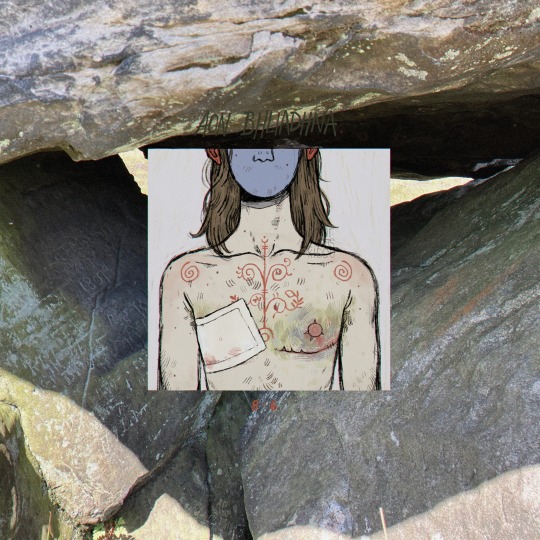
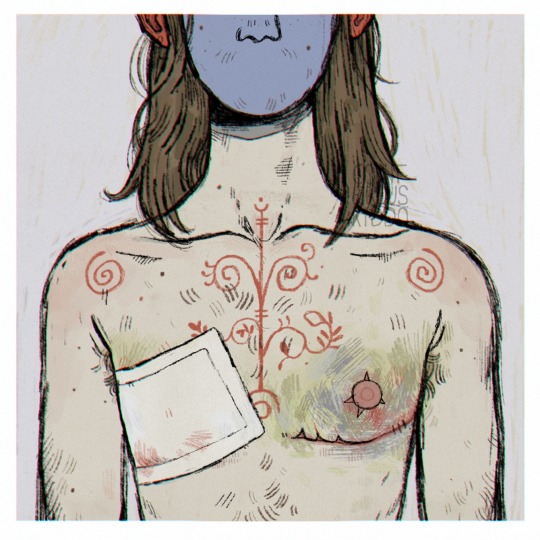
vaguely druidic drawing for / of myself - the 8th of june was the 1 year anniversary of my top surgery. im more alive now 𓇗 𓇗 𓇗
[Image ID: a small, square, stylized portrait framed by a photo of rocks with carvings, with 'Aon Bhliadhna' written in dark grey text above it and the date 8/6 bellow. The portrait is from the bottom of the nose down to the waist of a thin, pale skinned person with shoulder-length brown hair, a blue featureless face, except a nose, light facial hair and red ears. The chest has bruising and scars from recent top surgery on the right, and a large gauze bandage covering the left of the chest. There is a pattern in red, reminiscent of medieval plant drawings, from the sternum to just above the collar bone, the pattern has four spiralling sections splitting off it. Two red spirals are placed on the shoulder joint. End ID.]
#illustration#digital art#trans art#queer art#queer artist#artists on tumblr#lgbtq#queer#gàidhlig#coniferouskiddo#2023#thankyou sm cassie for ID help#(dont worry btw#my chest beneath the gauze was fine and not for long either. just had a small pocket of fluid drained on one side and i#i liked the asymmetry of it in the drawing)#described#need to remember to collage and things more with my photos. i rly like how it looks :'- ) plus its a significant photo to surgery too#from just before i had it
909 notes
·
View notes
Text

haven't been drawing as much cr art recently and especially havent drawn fjord in ages but i think long hair fjord has enlightened me actually so here's wildmother's lads - (don't tag as ship please)
[ID: two digital right-facing portraits of Fjord and Caduceus from critical role. they are in a rough painterly style. Fjord is a half-orc with vitiligo-like green skin and shoulder length salt-and-pepper hair, half tied back in a bun. He has a star earring, a beard, small tusks, and scars on his face. He's wearing a brown cape with a silver broach. Caduceus is a thin firbolg with pale grey skin and long pink hair. He has a long beard tied with a bead and purple under-eyes and a spiral earring. he has a pale green collared shirt with spiral embroidery and pink fungi growing on him. writing at the bottom of the image reads: "fhiadhaich-bràithrean". End ID.]
#critical role fanart#critical role#fjord stone#fjord#caduceus clay#critical role campaign 2#the mighty nein#cr2#wildbrothers#myart#2023#gàidhlig#described#shout out to tumblr users fjorrd + yarngirl98 art for inspiring long hair fjord :-) he is so slay#also i want to draw a cool fairy taley medieval thing but . portraits for now.
1K notes
·
View notes
Text
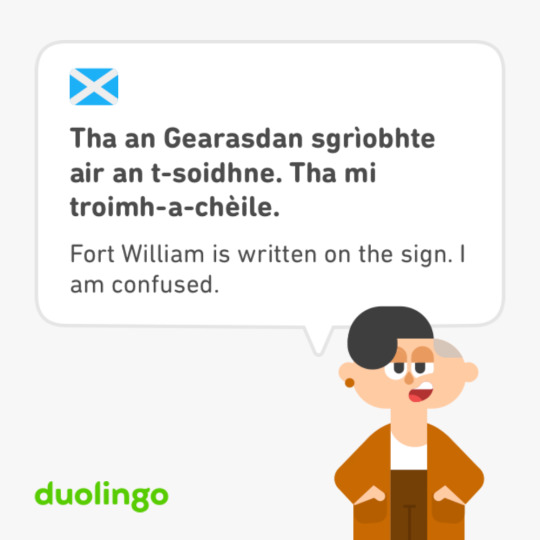
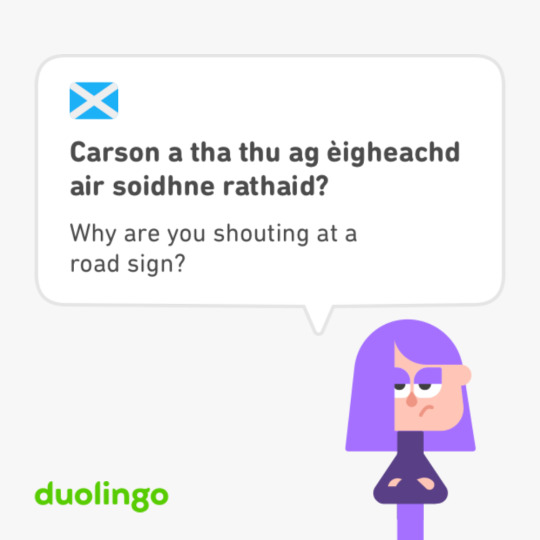
There was a whole lesson in Duo with sentences like this, and (what remains of the discussion threads) were full of comments like "lmfao" "amazing" etc, so I went looking-
Imagine being such a nob a language course dedicates a lesson to dunking on you!
186 notes
·
View notes
Text
For people who've shared worries about the future of Gaelic and of the Gaels, as well as some concern of the history of violence and dispossession that have faced them, this is an excellent opportunity to actually concretely help out, especially for those of you who don't speak the language. If you want to support decolonisation in the Highlands monetarily, then this is your opportunity.
187 notes
·
View notes
Text
I now have polls and want to find out about language communities on tumblr!
I'm considering doing another with languages like Old Irish and Middle Welsh if any of that crowd see this to see what people have studied coz I'm nosy and sad that I'm not gonna be able to study them at uni and so learning bits of Old Irish through memrise and books lol
631 notes
·
View notes
Text
right i have a question for u bilingual lot,
i would really like to learn a language other than english and was hoping to get some possible advice, sort of like where to start, how to keep it fresh in my mind and not something i get bored of a couple weeks from now cause wah wah its too hard
if u guys have any tips please let me know ! im most interested in learning a language like scottish gaelic or welsh, but also i am a classics student and think itd be really cool to learn greek or latin, ofc i'm aware these may be difficult languages to start with so im honestly open to anything !
#bilingual#gaelic#scottish gaelic#gàidhlig#welsh#cymraeg#language#languages#greek#latin#learning languages#i really want to stick with a language and actually be fluent#polyglot#langblr
63 notes
·
View notes
Text
I've been flicking through Gaelic Proverbs and Proverbial Sayings (1926) by T. D. MacDonald, and there are some crackers, especially when it comes to the clans.
Leathaineach gun bhòsd
Dòmhnullach gun tapadh,
Is Caimbeulach gun mhòr-chuis,
Tri nithean tha ainemh.
A MacLean without boast,
A MacDonald without cleverness,
A Campbell without pride-
Three rarities.
Heh.
Spagadagliog Chloinn Dòmhnuill,
Agus leòm nan Leathainich
The MacDonald swagger,
And the MacLean airs.
So, what I'm getting is that the MacDonalds and MacLeans were all gallus bastards. XD
Cha bhi gean air Granndaich gus am faigh iad lìte.
Grants are never gracious till they get their porridge.
Not morning people, then? (Me neither.)
Camaranaich bhog an ime is sliomaran a chàise.
The Camerons - soft as butter and fawning for cheese.
WHAT DOES THIS MEAN?? Would be great to work into a Heron fic!
And, oh, I am definitely working this into a Kidnapped fic somewhere:
Stiùbhairtich, cinne nan righ ’s nan ceàird.
Stewarts, the race of kings and tinkers.
I guess there must've been lots of Stewarts who went around reminding everyone that they bear A King's Name™. :D
67 notes
·
View notes
Text
Does anyone have any song recommendations for songs in any of the six celtic languages?
#gaeilge#scots gaelic#welsh#welsh language#cornish#manx#breton#celtic nations#celtic languages#song recommendation#gàidhlig#gaelg#brezhoneg#kernewek
347 notes
·
View notes
Text
#langblr#celtic#celtic languages#welsh#irish#cornish#breton#cymraeg#gaeilge#gàidhlig#kernewek#breizh
47 notes
·
View notes
Text
Fáilte ! 🍀🫧🌌🤍✨
I’m Anna and I’m a fluent Irish speaker, currently doing a degree in Irish ☘️ I’m also learning Gàidhlig (veryyyy similar to Ulster Irish!) and also learning Norsk (Norwegian)
I’m a language nerd, and love etymology and the history behind the words and links between languages !
Expect lots of language posts, strange and magical words, music, and poetry !! 🍀🤍🔆
#irish language#irish+language#gaeilge#anghaeilge#irish poetry#irish#langblr#language learning#norwegian#norsk#jeg lærer meg norsk#gàidhlig
26 notes
·
View notes
Text
It'd be cool to come up with Pagan alternatives to the days of the week in the Gaelic languages, since the current ones have such Christian meanings
DiLuain can stay since moon worship is a thing, but perhaps we might change the Latin to "Latha na Gealaich"?
DiMairt could be "Latha na Mhór-ribhinne" (The Morrigan's Day) in keeping with the "M" sound of "Mairt"
DiCiadain needs to go since it refers to a Christian fast, so why not make it Latha an Daghdha? (A sort of oblique reference to Wednesday being "Wodan's Day" in English perhaps?
DiarDaoin again refers to fasts, so maybe "Latha Lùgha"?
DihAoine, another fast, so how about "Latha Aoidh" since it sounds kinda similar to "aoin"?
DiSathairne isn't Christian so much as the wrong kind of pagan, so I'm not against leaving it as is, but as long as we're going with new names, why not "Latha Manannain"?
DiDòmhnaich is perhaps the most explicitly Christian, but since we have "Latha na Gealaich" already, I propose substituting "Latha na Gréine"
I was obviously a bit inspired by the Germanic names here, but I'm curious to see what everyone else's thoughts are! I came up with these off the top of my head, so I make no guarantees about their appropriateness or linguistic accuracy (I'm a Gaelic learner, not a fluent speaker).
#gaelpol#gaelic polytheism#gaelic paganism#scottish gaelic#gàidhlig#gaidhlig#paganism#pagan#an dagda#the morrigan#lugh#aed#manannan mac lir#ireland#irish mythology#gaelic mythology
49 notes
·
View notes
Text
LGBTQ+ terminology - as Gaeilge ☘️🌈
Now, pardon me, but before I get to the meat of this post, the LGBTQ+ stuff, which is what I know we're all looking for 😁 I gotta do a little rant first
😌🙏😙💨
While I deeply appreciate the efforts of several groups over the last couple of years to translate English-language terminology and understanding of gender and sexuality, and the digression and non-conformity belonging thereto, I believe that, ultimately, it's a placeholding wedge-in that contributes to the wider problem of Anglicisation, or more accurately "Béarlachas", as it affects the Irish Gaelic language.
(Yes, I do be calling the language Gaelic - No, I am not American. I have a reason for doing so which I'll elaborate on in another post*.)
Now, Béarlachas is *not* borrowing and loaning words from English and using them seamlessly in Irish - a thiarcais, Irish speakers have been under the yoke of that language for over nine-hundred years, stating that we cannot adopt and adapt its words to our language is tone policing and language oppression of minority language speakers at it finest 🤌.
No, "Béarlachas" is the enforcement of the English-language thought process onto Irish. It comes from a place where thinking that English is more advanced, and has developed ways of understanding, and assuming that no other language, or in this case, Irish, has not caught up, or needs to rely on English.
You can see how this is a problem, right?
Queer people have always been everywhere. People distorting gender and sexuality norms have always been around. I remember growing up and an elderly family member from deep deep rural Ireland saying "Them townies always be looking down and calling peeple transvestites - sure out here that's only Amateur Dramatics!"
One of my parents has a story of knowing an "Auntie Bob" in their local town, someone who lived on the edge of the village, but not shunned by any modern transphobia standards.
There are so many queer stories lying under the surface - so plentiful that I'd encourage anyone to talk to older family members, or elderly people in your community. Now obviously, they won't have our modern terms like "queer" and "transgender" for them, but the stories, the people, are there 🎊.
- rant ends -
Anois! What we've all been waiting for:
LGBTQ+ slang, slurs, terms and explanations in the Irish language 🏳️🌈🥳
Starting off, what does the Irish language call "gender" and "sexuality"??
Sex (the act) is usually referred to by learners, second-language speakers and official dictionaries as "gnéas" - but a lot of vernacular speakers refer to it as:
Collaíocht
The word comes from the word collaí, meaning "carnal / sexual", which itself comes from the word colla, which in turn is a variant plural form of the word colainn, meaning "body". So a way of understanding collaíocht, would be thinking of it as meaning "body-ing", which ultimately, I think, is a cuter, more accurate and reflective way of referring to the act than Sex.
Gnéas
This is the word most dictionaries have down to describe the act, but let's have a fresh look at the word. Just as teas (heat) comes from the word te (hot), the word gnéas comes from the word gné. The following is the entry from the Ó Dónaill (1977) 'Irish-English Dictionary' for 'gné':
1. Species, kind...
2. Form, appearance
Form, appearance... further down the entry, we also have the word "aspect", as in "every aspect of the matter"... I wonder... sounds an awful lot like gender here to me - and at the time of Ó Dónaill, Ua Maoileoin and de Bhaldraithe composing their dictionaries, 'sex' and 'gender' would have been interchangeable terms.
While I have yet to look into this further, I have to wonder whether ascribing "gnéas" to the act of sex, rather than sex as in "gender" is a case of Béarlachas: applying English-language understandings to Irish-language words.
Which brings me around to:
Inscne
The word that I suspect of being a definite case of applying an English-language understanding to an Irish-language word. Inscne comes from Sean-Ghaeilge "insce", meaning a saying, a statement or word, and was applied to the sense of grammatical gender, or 'noun class'. Modern groups and most second language speakers apply the word to the English understanding of gender (most vernacular speakers I know simply borrow "gender" from English). Again, my own opinion and proposition, would be to use gnéas for gender, collaíocht for the act of sex, and cineál for sex (body type).
Cineál
Furthermore, Scottish Gaelic 🏴 also uses 'gnè' for gender, and 'tar-ghnèitheach' for transgender. The word for sex as in body type is 'seòrsa' - which is equivalent to the Irish cineál, which also has been used to describe body types. I think this understanding of the word cineál would be great to separate the traditional understanding of gender = body, and help us in any case to destigmatise bodies 🤷.
*The above have been kinda the groundwork. Here come the slang and slurs™️ proper*
Piteog (derog.)
This is the one most people who've done a little digging will've come across. The explanation that usually comes with it is 'effeminate man, sissy' or 'fairy (derogatory)' - but let's break down this word more, and discover the misogyny, reductiveness, wlw-erasure and why it to really only refers to mlm and transfeminine members of the LGBTQ+ community:
Pit is the Irish for 'vulva'. -óg or -eog is a suffix that kind of implies "like" - e.g. a camóg is something that's kinda cam (bent), i.e. a hurley. Piteog literally means "something like a vulva" 🤷.
Buachaill bán
No, not the Whiteboys of 1800s agrarian agitation in Ireland 🤣, but again another term for men-loving men. I think it's kinda poetic that the rainbow 🌈, the modern global symbol of LGBTQ+ people, is made up white light through a prism, and that the colour white was used to describe a sector of LGBTQ+ people in Ireland fadó.
*The only reason I'm saying this is an mlm term is because I've never come across it being used to describe wlw or other queer identities - but perhaps it could be used in a broader context?? Idk.
Lúbtha ("lúpthaí" i gConamara)
Literally translates as "bent". Lúb as a verb means "1. to loop, 2. to enmesh /to net, 3. to bend". Those in/from the Gaeltacht that I've spoken to of an older generation use it casually, with no obvious negative intent behind it, tho I've come across several middle-aged people who are scandalised if you say it (to the same extent as saying someone's 'bent' in English) but I dunno if that is from intergenerational difference is use (whether it became a slur in the last half-century or so) or if it comes from Gen X aversion to calling people 'bent' in English, and them correlating it to Lúbthaí in Irish.
Cam (slur)
Cam is a slur. While yes, it simply means 'bent', it carries the connotations of "crooked, sly, conniving" and in its usage, it is almost always unmistakeably intended as an insult.
Aiteach
I just want to put this on the list to discuss it. "Aiteach" is a modern construction. If you look up 'queer' in the dictionary, one of the entries you'll get is "ait", meaning 'pleasant, likeable, comical, fine, queer'. Ait is still used in everyday language (we all know the phrase "Is ait an mac an saol"), and was never used to describe LGBTQ+ people, but because of its positive connotations and appearance under "queer" in the dictionary, -each was added onto the end to describe LGBTQ+ people without having to use the abovementioned slurs. Yes, it is borderline Béarlachas, but most young Gaeil (Gaeltacht natives / vernacular speakers) I know don't have a problem with it 😁.
Gearrán
I've noticed the conspicuous gap of wlw specific terminology in this list. What can I say, 100 years of Catholic nationalist censorship on top of a patriarchal organisation of society makes them hard to come by. However, while I've never heard this word used, I've been seeing Gearrán more and more in online spaces lately.
(No, it's not related to gearán (complaint), and the two r's change the vowel sound of the 'ea')
It translates to a gelding, or a pack-horse, and according to Ó Dónaill (1977), can also mean a "Strong-boned woman; drudge, jade", and if that isn't a euphemism for a butch lesbian, idk what is.
Alright, that is an infodump and a half!
And there's still so much I could say... Lads, let's just say there's loads more to come 🤣
Slán tamaill 👋
#gaeilge#irish language#gàidhlig#gaelic#LGBTQ#lgbt history#lgbtq people#vernacular#indigenous language#intergenerational#relations#family history#LADT#LADT7#irish#postáil fhada#tráchtas#essay
361 notes
·
View notes
Text


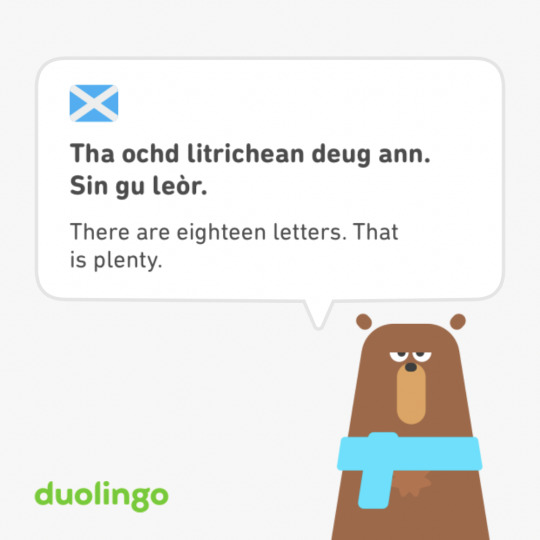
Got these sentences all in one practice lesson in Duolingo
#duolingo#gaelic#scottish gaelic#gaidhlig#gàidhlig#screenshot#screenshots#language#language learning#languages
16 notes
·
View notes
Text
SpeakGaelic: a guide!
Sabhal Mòr Ostaig, the national centre for Gaelic language and culture, recently worked with BBC Alba to produce videos, audio and a website called SpeakGaelic.
There’s videos, an online course, support for tutors, multiple new podcasts, Youtube, various things airing on TV. The actual self-taught online course is only one part of how much this resource has to offer! So here’s some of the things I’ve been looking at.
1. The website itself
https://speakgaelic.scot/all-online-courses/
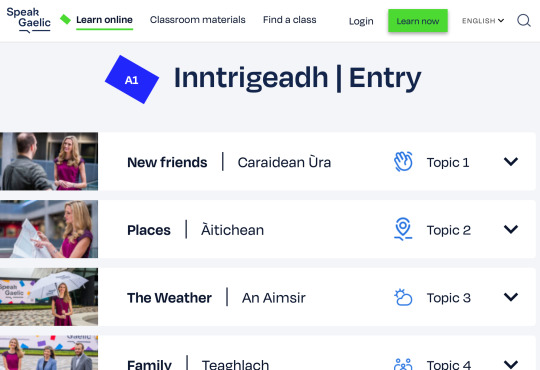
This is just the whole website: explore at your leisure! At the moment they have finished up to around A2 level, and are working on producing higher level content.
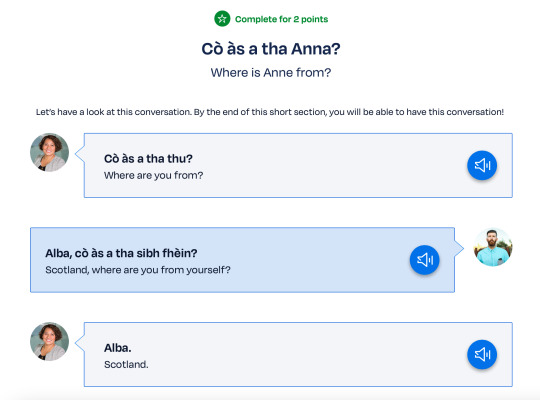
Each topic has a series of 8-10 mini-lessons that are sometimes more duolingo style, and sometimes with videos.
I...actually prefer to use the teaching resources for tutors (linked below) than this course for a few reasons. My main problem is that the vocabulary they present to you is far too fast (in one lesson they might give you 20 words for different Scottish towns), which is fine if you just need to choose the relevant words for where you are from, but in order to pass the quiz to get to the next level you have to get ALL of them right. And Gaelic spelling takes a while to get used to...
There’s also no writing / spelling practice, but to pass the level requires you to write things. Which. Feels counterintuitive! You can learn any level without passing the tests, but it’s annoying because it means your progress isn’t saved to an accurate place. I emailed them about it and got a friendly response back, but this isn’t something they are planning to change.
2. The classroom materials
https://speakgaelic.scot/classroom-materials/
Now THIS is where it gets exciting. These are materials designed in theory for tutors - full lesson plans, worksheets, everything - but they are accessible to learners too. In fact, I think they’re much better than the online course.

Why? Because everything is STRUCTURED. You are given practice, and told what to do, and there are grammatical explanations. (NB: all of these exist in the online course, but not in one handy document for you to look over in one place.)
You have all of the learner content....
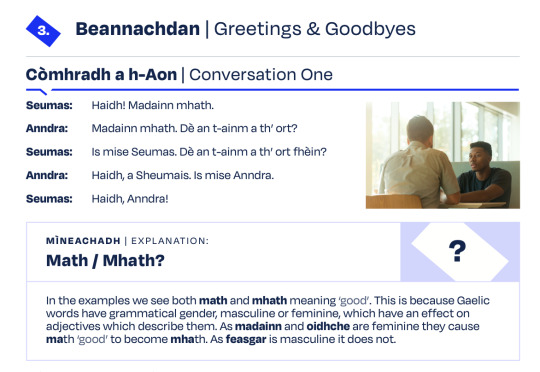
...and you ALSO have teacher content:

‘If learners need more time and practice with the vocative case’ > that’s me! And it shows you then exactly what you should do next. Whereas the online course doesn’t have that option for customisation at all. Most of the worksheets are included in the lesson plan, and some are on the main page. Absolute bliss.
3. The SpeakGaelic learner podcast
https://open.spotify.com/episode/6x5b901Zj8ky0UsMM4SzZM?si=00c361fe5ffc4f0d
(If you don’t have Spotify, you can just search ‘SpeakGaelic’)
This is an audio version of the lessons above, and goes into more detail - with information from three different native speakers - into some of the grammar things that the course doesn’t really cover in that much depth. There’s conversations you can listen to, and it’s all targeted at complete beginners. If you listen to any other Gaelic podcasts you’ll recognise the presenter, John Urquhart!
After each episode, there’s also a special episode - scroll down to the bottom - with conversation about different topics relevant to the day’s lesson with two of the presenters. Great for providing extra information!
4. The Youtube channel
https://www.youtube.com/watch?v=ppoHU_ece7o&list=PL_U7jPRkbJZtFegaqKKT8MrZnV7ugwHAG&index=1
Ok, so there’s a LOT of content here. First you have the A1-A2 lessons, around 30 minutes each. Despite what the name suggests, these are not the same as the audio podcasts. They have Joy (who presents the online course) but they also give some extra video clips and information about cultural things too!

They’re a little slow, but a good supplement to the material given above. As far as I can tell, there are only 13 of this particular series (and 13 for A2) but the YouTube channel SpeakGaelic itself has hundreds of episodes of everything that goes into the online course. All the videos can be found there.
This includes all audio and conversations, as well as snapshots on individual learners and some cultural information.

They also seemingly have started marking some grammar videos! Check out this playlist for more grammar: https://www.youtube.com/watch?v=Pq9_0ht4L3Y&list=PL_U7jPRkbJZu0uq_6wpzCgZcpddGDU76D
5. The intermediate podcast: Beag air Bheag
https://open.spotify.com/show/34wGOU9sDTE7Vzg0qMexfv?si=314cbbb294b648ec
Once you’re a little further on in your journey (I...can’t understand these yet), there are a few other podcasts on Spotify also by the BBC Radio nan Gàidheal. This is one! This is totally in Gaelic, but spoken fairly slowly and designed for intermediate learners.
6. The old site: learngaelic.scot
https://learngaelic.scot
Check it out! I...actually prefer this site and the way it teaches. It has some bonuses over the old one - good vocabulary sections, plus a really great directory of Gaelic courses online and in person, as well as a dictionary, and so on.
It goes all the way up to B2, so is a better choice if you have more than a little Gaelic.
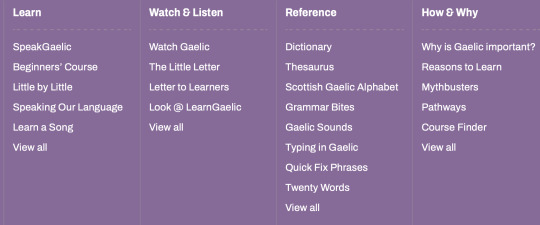
It’s also a brilliant directory of media in Gaelic - you can watch lots of videos with transcripts in Gaelic with a dictionary, as well as finding native-level material. You can sign up to their newsletter and get weekly Gaelic information too.
It also has links to Speaking Our Language!! Which is an absolutely wonderful resource from the 90s teaching Gaelic one conversation at a time, and also goes up to a fairly high level. These are all updated for The Modern Age: i.e., they all have PDFs and transcripts, as well as links to the grammar points for whatever lesson you’re listening to. Far more advanced than anything the new site currently has.

I might do another post once I’ve explored this website a little more!
7. Bonus: Gaelic with Jason
Finally, one extra! The other main resource I’m using is Gaelic with Jason (https://www.youtube.com/watch?v=5rAE_iLRh4g for example).

He has a whole bunch of free Youtube videos, but I’m actually doing his paid online course - it’s by the best value for money I know from any course, Gaelic or otherwise. If you have the money for it and like immersive learning with a board and just being chatted to, I’d highly recommend you give it a go. He also has loads of Gaelic books for learners, which are wonderful too, and a folktales and traditions course for intermediate learners. Can’t talk about this man enough. (https://gaelicwithjason.thinkific.com)
---
Once again, I’d really encourage you to check out the teaching materials: I personally find them way more useful than the online course for learners specifically. I’m looking at the teaching materials in conjunction with the audio on YouTube and then the podcasts on Spotify.
All the best!
- Melissa
#gàidhlig#gaelic#scottish gaelic#langblr#studyblr#learn gaelic#seriously guys there are SO MANY resources out there#mainly these two sites though lmao but the amount of ancillary content is insane#anyway. once again. anyone learning: hmu!#I'm very much learning casually but it's great fun when I don't want to think about korean or chinese lmao
656 notes
·
View notes